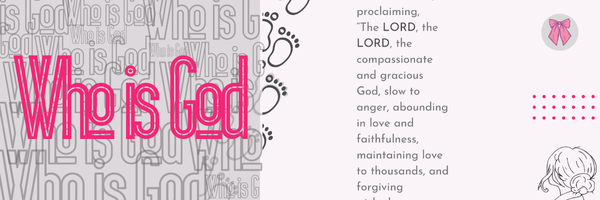Who is God, Really ? II
What do we really know about God? Is our representation of Him accurate?
WHO IS GOD?
kiikii
5/18/20253 min read


I've decided to spin this topic into a mini-series. While I’m uncertain about the number of entries it will include, one thing is clear: I've gained a wealth of knowledge about the Lord in the past months, and I’m excited to share it.
So, who is God, really?
And who better to inform us than the Almighty Himself?
“The LORD, the LORD God, compassionate and gracious, slow to anger, and abounding in lovingkindness and truth (faithfulness); keeping mercy and lovingkindness for thousands, forgiving iniquity and transgression and sin; but He will by no means leave the guilty unpunished, visiting (avenging) the iniquity (sin, guilt) of the fathers upon the children and the grandchildren to the third and fourth generations [that is, calling the children to account for the sins of their fathers].”
In my earlier discussion, I examined God’s compassionate and gracious nature in the Garden of Eden, even following humanity's fall. As I continued my quest to grasp the true essence of the Lord, I explored the book of Genesis more deeply. Chapter 4 recounts the lives of humanity outside the Garden, where Adam and Eve settled and welcomed children named Cain and Abel.
It’s intriguing to realize that, despite their expulsion, they did not forget about God. They imparted the knowledge of the Lord to their children, and it appears that God continued to communicate with them. The Bible reveals that, in due time, both Cain and Abel presented gifts from their possessions to the Lord. However, as you reflect on this scripture, it becomes evident that simply giving to the Lord is not enough; the disposition of your heart is of great significance.
Questions to Contemplate:
How do I approach the act of "giving" to God?
Am I presenting my very best?
Or do I give merely out of a sense of obligation?
The Bible tells us that the Lord respected Abel and his offering, but did not respect Cain and his offering. This greatly irritated and annoyed Cain. The Lord saw this anger in Cain and tried to warn him like a loving Father would do, saying, “Why are you so angry? And why do you look annoyed? If you do well [believing Me and doing what is acceptable and pleasing to Me], will you not be accepted? And if you do not do well [but ignore My instruction], sin crouches at your door; its desire is for you [to overpower you], but you must master it.”
But how did Cain take it? In fact, how do most of us take the Lord's warning today?
As you delve into the chapter, you realize that Cain was unable to "master" or "subdue" the power of sin, which ultimately led to him killing his brother. After this tragic occurrence, the Lord, fully aware of the situation, approached Cain and asked about his brother. I strongly believe this was Cain's opportunity to embrace repentance and seek forgiveness, but he chose otherwise. Rather than showing remorse, he tried to outwit God with his arrogance. What was the outcome of that decision? Clearly, God imposed punishment on him, declaring, “And now you are cursed from the ground, which has opened its mouth to receive your brother’s [shed] blood from your hand. When you cultivate the ground, it shall no longer yield its strength [it will resist producing good crops] for you; you shall be a fugitive and a vagabond [roaming aimlessly] on the earth [in perpetual exile without a home, a degraded outcast].”
And once again, we acknowledge the God we all recognize—the one we learned about in Sunday school, who is known for His severe punishments. Cain appeared to share this perception when he replied to the Lord, saying, “My punishment is greater than I can bear. Behold, You have driven me out this day from the face of the land; and from Your face (presence) I will be hidden, and I will be a fugitive and an [aimless] vagabond on the earth, and whoever finds me will kill me.”
And the Lord, being so compassionate and gracious, considered his worry, and responded, “Therefore, whoever kills Cain, a sevenfold vengeance [that is, punishment seven times worse] shall be taken on him [by Me].” And the LORD set a [protective] mark (sign) on Cain, so that no one who found (met) him would kill him.
This is our God: compassionate and gracious, slow to anger, and overflowing with lovingkindness and truth (faithfulness). He maintains mercy and lovingkindness for thousands, forgiving iniquity, transgression, and sin; however, He will not leave the guilty unpunished. While He administers punishment, it is not out of hatred or malice, but rather for our correction. He does not wish for us to suffer; instead, He calls us to turn to Him and find life. "Turn from your wicked ways and live," as stated in Ezekiel 33:11.
Thanks for reading, I hope you were blessed :)
Until next time, stay nerdy and attractive ;)
